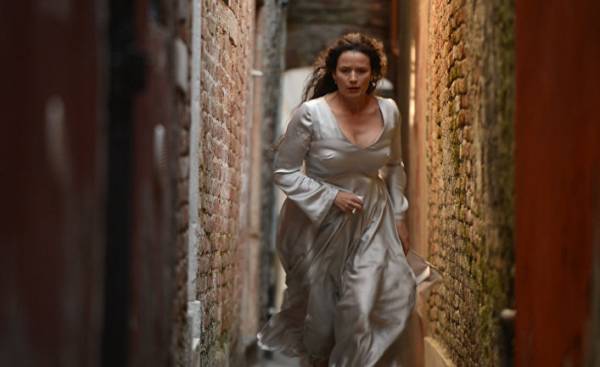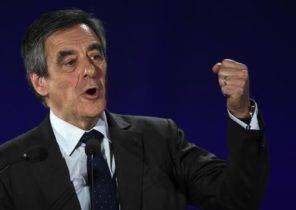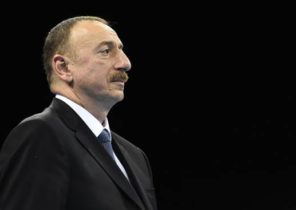
Torild, Mouse (Gørild Mauseth) in his new film travels with her son and husband through the whole of Russia.
On the street whips of rain when Torild, Mouse, shivering, enters the café. She grins, unbuttoning his wet coat.
“Yeah, we both do not look too presentable,” she laughs, and we sit at a free table.
Travelled all over Russia with his son
The conversation quickly moves to its current awfully tense days. We meet with Mouse when it makes final touches to his new film “Karenina & I”, which will premiere on February 24. But, although the film takes a lot of time, everyday life must go on as it should go.
“I am very glad that I have a child. Spending time with him is a great joy. But time is absolutely not enough. I recently just talked about this with Margaret Olin (Margareth Olin): how do we do the energy come from? As artists, we are the last person goes to bed and gets up,” she smiles.
She and her husband Tommaso Mottola (Mottola Tommaso) is the son of Baltasar, who is eight years old. Baltasar takes part in “Karenina & I” plays the baby Karenina.
In the film we are talking about the trip, Mouse across Russia: she needs to perform the title role in “Anna Karenina” in the Theater of drama named after Maxim Gorky in Vladivostok.
The film was Mottola.
Preparing for the Grand project began in 2011. Mouse suggested to play a major role in “Anna Karenina” at the State theatre.
“At first I was in doubt. It was not the role I dreamed of. I must admit that I never read the novel. This is one of the novels that everyone is talking about, what I read, but really until the end of his reading, very few. But I read it, and then found their Anna,” she says.
“When Tommaso decided to make the film, he said that I cannot so simply to take and to arrive at the rehearsal in the theater. He sold me on to travel across Russia, leaving behind a and Norway, and Europe. I had to delve into the culture of Anna Karenina, to get into the character of Anna. Had to take Baltasara,” she says and continues:
“Anna has lost her son and you have a son,” said Tommaso. Baltasar is like this child.
“Everything foreign”
When they went on the train to travel the length of 11 thousand kilometers across Russia, the son was four years old.
“If I were a man, I would, of course, did not go for it. I would just go by plane and the wife and kids would just show up to the premiere” was Mouse, but then gets serious again:
“It is something like that I wanted to show what happens when Actresses get a chance. I had to take care of all the logistics, and before the trip and during the trip, and when we arrived at the scene. I had to find children with whom he could play, kindergarten, which he loved. We helped a Russian nanny, but he wanted to go to kindergarten. So in between rehearsals I had to go and spend “listening” kindergartens,” she says.
At the same time that she had to teach in Russian heavy role, it was necessary to ensure that Baltasar was good.
“The care of a nanny, he could play, to go to museums and do all the things that children like to do. But as a mother, I of course had to take care of the fact that he was wearing clean, not starving, eating what he likes… And everything was so strange, even the taste of everything else. Even the bread tastes different,” she says.
Place in a kindergarten
After visiting a few kindergartens, Mouse found for Baltasar kindergarten, which brought the Montessori system.
“It was awesome! They are doing choreography, Taekwondo, artistic items… they had a wave pool that children used to be in the water. They listened to classical music. They even had a private pediatrician who took care of the children if they were sick. Another was a speech therapist and teacher of singing.
“Home of Baltasar never wanted! I was planning to pick him up after rehearsals, but he preferred to be in the garden until closing time,” she sighs.
But here is the kindergarten food Baltasar didn’t like.
“God knows what he was eating. He liked to help set the table and see that everyone had what they need, because then no one paid any attention to how little he ate himself. It seems to me that at the time he ate a lot of carrots, bananas and bread,” she says.
“I taught Tolstoy, he taught Russian”
The little boy quickly learned the language.
“He learned Russian better than I do. I taught Tolstoy, he taught Russian. Bilingual children have advantages. He went to a kindergarten in Norway, and in Italy,” she says.
She remembers the first time I heard Baltasar speaks English.
“It was a few years ago. We sat at the table and had Breakfast, he suddenly looked at us and said, “Can I have some bread, please?”, and then he said: “It’s excellent”. And he was only three years old! And he was absolutely incredible pronunciation,” she smiles.
At first they could not understand how the son managed to learn English with a British accent, but I quickly realized what happened.
“All that he then said, he learned from “Dora” and “Diego””, she laughs and calls the cartoons “Dora the Explorer” and”Go Diego Go”.
“I certainly talked to an awful lot of strange”
It is obvious that the knowledge of the language is important for understanding culture.
“You become closer to people if you speak their language. This is exactly what I wanted: to understand the country. I was in Russia three or four times, but not for several months. This time I began to see the country and culture completely different,” she admits.
But learning Russian was difficult.
“You know that I spoke Russian rather strange. In theatrical the dining room, I mostly eat hard boiled eggs and soup. Learned to order this in Russian,” she says.
However, it turned out that she learned to enjoy not quite right.
“The word “eggs” in Russian sounds almost the same as the Russian word for baller (testicles). So I for many weeks booked in the dining room (male) testicles. And that was not all: I insisted that they should be cooked hard boiled. Finally one of my colleagues took pity on me and said, “You have a few weeks to order in the dining room of the male hard-boiled eggs,” she says and laughs sincerely.
“I actually talked a lot strange. Fortunately, people think it’s funny when foreigners speak properly. Neither I nor Morten (Borgersen, Director — approx. Sib.) could not know whether what we say, so there were a few people who helped us and had to correct if we made mistakes. It was like some kind of extreme sport,” he continues Mouse.
“Seven I”
Gradually to speak the language became easier, especially the attention of Mauseth attracted one word.
“The word familie in Russian sounds like “family”. I was told that the word means “seven I” To be that family, we have to have two parents and two grandparents. Don’t need no brothers, no sisters, no aunts, no uncles, you need seven of you to become a. I just fell in love with this word.”
No one doubts that Mouse beautiful language hearing. She speaks seven languages and understands even more.
“I’m not afraid to say, the enthusiasm I have. I learned Italian for a year, but my friends still smirk when I’m talking about. When I say that I don’t remember the word that I need, I just quickly look for something that sounds logical,” she says and laughs.
“Yes. I’m so, I’m terribly curious. It was one of the reasons why I agreed to it,” she says.
A terrible example for mothers and women
History and character of Anna Karenina captured her. And because she is a mother, she believes that to get used to the Anna’s fate was a hard one.
“Anna Karenina gives birth to two children, she leaves two children without a mother. She was an orphan as Fat. I ask trying to figure out: who was she? Who was she to children? And she is a terrible example of a mother and woman. Why couldn’t she become a better mother?” — asks Mouse.
“It’s so interesting to ask the question about why she left the children,” she adds.
She thinks that many of the sufferings of Anne come from the personality of Tolstoy.
“Tolstoy was not a divorce, but he first lost his mother, then father, then grandparents… All who could take care of him, died,” she says.
She visited the Tolstoy estate
“I visited the estate of Tolstoy, Yasnaya Polyana, met with his relatives. He has no headstone — he wanted to be buried in the forest where he could find “green stick,” she says and continues the story.
“The tale told to him by his brother, that if you find absolutely green stick, all will become friends, no one will die, the world will have peace. It is here that we meet Tolstoy-a humanist. He wanted to be buried here and disappear, did not want any monument or honor”.
Lived like a true Russian
When they arrived in Vladivostok, Mouse decided that he wants to live like an ordinary Russian.
“First, we have provided a large luxury house in the city because I was “star from Norway, who will play Anna Karenina”… But I said I don’t want to live there. I wanted to live where people live. And we were given an apartment in a typical East European apartment block, with light bulbs that burned not always, flapping from the wind by the door, the smell of cabbage, boiled cabbage and porridge,” she recalls.
Although this life was hardly luxurious, the family in the apartment liked.
“It was a completely normal apartment, we made it his own. We lived there for three months,” she says.
A lot of work
In the theatre actors took it well.
“Been good to me, it was like a big family. As you walk, once you feel the same atmosphere as in the National theatre, and the Norwegian theatres. But it was more old-fashioned — all written by hand, they didn’t have the Internet. And even in the theater had a lot more employees,” she says.
It was still something that distinguishes the Russian from the Norwegian theatre:
“The strongest contrast is the smell from the dining room. She was popular, because it prepared well there, the food was really tasty, but the smell… I Think that our FDA is unlikely to be allowed the dining room to work,” she says with a smile.
Acting work in Russia also demanded more power than in Norway:
“When I accepted the offer, I didn’t know that everything would be so strict. I didn’t know that the Russian actors working on Saturdays and Sundays that I will have only one Monday in a month. I thought that I would be free before and after rehearsals, and could not imagine that I will work twice more — both day and night,” she says.
Despite difficult working conditions, all the actors showed extraordinary professionalism, she said.
“The actors are incredibly talented. Never complain, although in comparison with actors in Norway, they actually do not make money, we are talking about here, which almost do not make money,” says Mauseth.
“Your English, I completely lost”
While Mouse taught Russian, Russian actors were trying to learn Norwegian.
“They taught such Norwegian words like “true”, “snow”, “I love you”, “Yes”. They always said “ja” (“Yes”) on the inhale, because it seemed to them that so say the Norwegians. Slightly mocked our way of speaking,” she says.
Director Borgersen worked in English, and they Mouse could speak Norwegian.
To understand when she spoke English, Mausam had to forget all about the British and the right accent.
“They spoke quite differently. For example, they said, “I understand for you”. I also became so to speak. Advice to anyone coming to Russia: speak English as bad as I can.”
Consuming work
In the film, Mausam says that she lived with the role 24 hours a day. It wasn’t easy.
“It was incredibly difficult because it was a penny. In the end, I began to spend more time than at home. I’d describe it as an all-consuming job. It was much harder than I thought. Thank God I had a husband and a child, so had to part with them,” she says.
Fortunately, Mustad have experience of solving complex problems. In 2008, she filed a lawsuit against tele-radio broadcasting company NRK after she showed a scene from the film “Burnt by frost” (“Brent av frost”) in the “Big Studio”. In the scene you can see, Mouse and Stig Henrik Hoff (Stig Henrik Hoff), sex in a boat filled with fish. Mouse and producer of the film was a written agreement that the scene should not be shown out of context and NRK knew about it.
“I have been assured that the footage will not be shown out of context. That’s why I was able to play this difficult stage,” said Mause on the court, according to NRK.
The future of our children
Actions NRK condemned the District court of first instance in 2008, but the broadcaster won the case in bankruptcy court a year later. In 2010 the case was heard in the Supreme court, and Mouse won. Today, Mauseth says that the proud began to struggle.
“It concerns the future of our children! This applies to all of us and those with whom we communicate. In this open universe, called the Internet and streaming should be limits. My job is one of those laws that should protect us all. And I’m proud of it,” she says.
What lesson have you learned from this lawsuit?
“The lesson is this: there is always someone who will try to use something to their advantage and abuse other people and the law. And that we have justice, which will protect us from this, if we only dare to raise a voice. Because often people simply do not. I hear you, and I won — went to the Supreme court,” she says.
Tours around the country
But now we are talking about “Karenina & I”. The film will be screened in 60 theaters, and Mouse have to go on a big tour — as well as with the State theatre.
“Yet never one Norwegian film was not distributed as used to do in theaters. We follow the same route as with the performances at the State theatre. We expect that audience will come back, and this time they will see the Russian version of the play”, says Mouse.
Before the film she wants to tell the audience about the fact that Tolstoy and “Anna Karenina” can you tell us about love. After the movie, she is ready to answer questions and chat with the audience about what they saw.
While the list of tour only in Finnmark, as well as in some other places. Full list will appear in connection with the premiere on February 24.
She looked forward to the premiere
Outside the rain had already surrendered. Mouse, picking up her things, puts on a coat. A few words thrown to the visitor café, and heard how she spoke Russian. Is preparing to demonstrate the project, five years the former part of her life.
“A little nervous: how it goes. I hope the audience will like the film,” smiles of Mouse.
Premiere of “Karenina & I” will be held on Friday, February 24.






